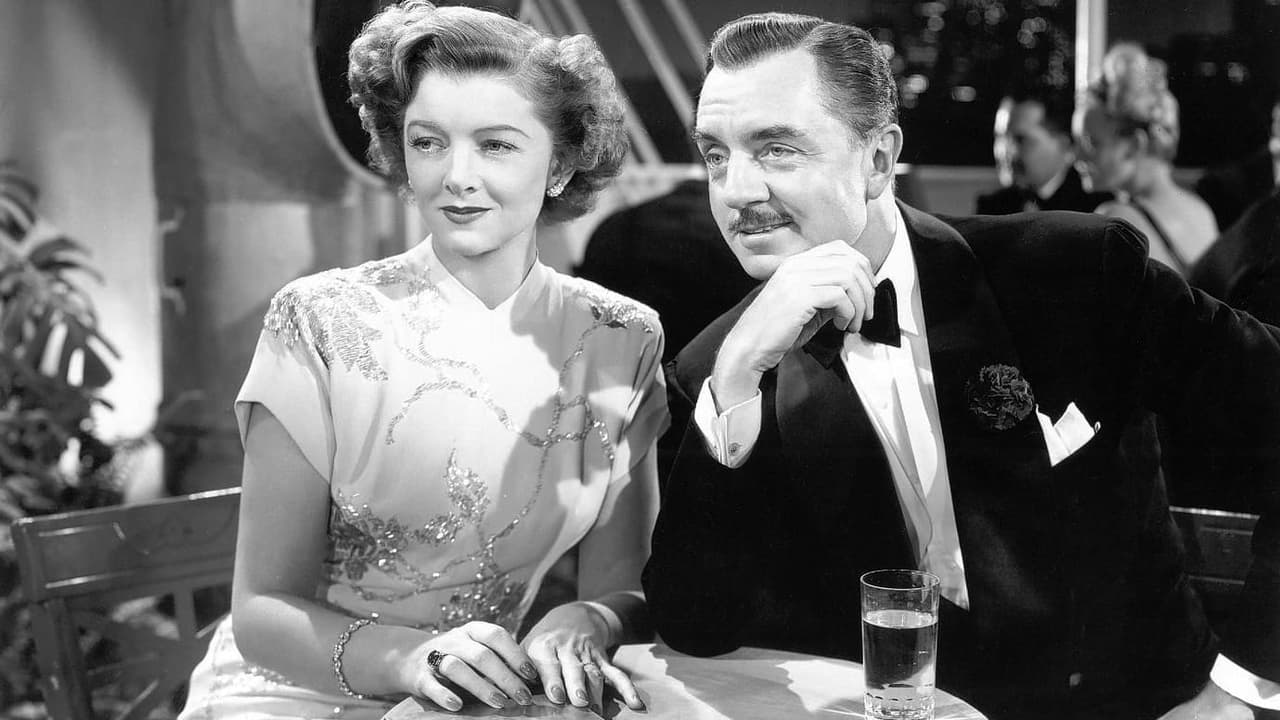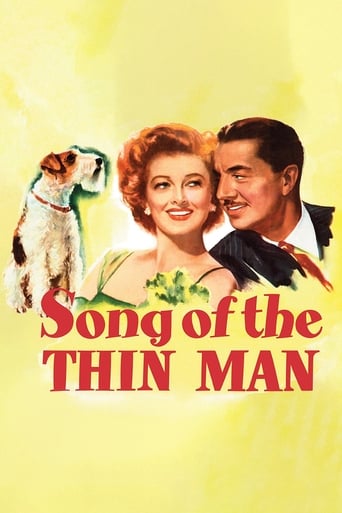

Just so...so bad
... View MoreBoring
... View MoreAs somebody who had not heard any of this before, it became a curious phenomenon to sit and watch a film and slowly have the realities begin to click into place.
... View MoreVery good movie overall, highly recommended. Most of the negative reviews don't have any merit and are all pollitically based. Give this movie a chance at least, and it might give you a different perspective.
... View MoreThe sixth and final Thin Man film starring William Powell and Myrna Loy as everyone's favorite husband and wife detective team, Nick and Nora Charles. Unfortunately the series does not go out on a high note as this is the weakest Thin Man film by far. The story has Nick investigating a bandleader's murder in order to clear a friend's name. A darker atmosphere, some uninteresting supporting characters, and jazz music that did nothing for me (including the ironically forgettable song "You're Not So Easy to Forget") makes this one a bit of a slog to get through. The biggest problem is that Nick and Nora just seem kind of dull. Also the way they're portrayed as two people out of step with what's cool just makes them look old. Yeah they're maturing and have a kid and all that but I don't like to think of the Charleses like the rest of us. They should always be witty, fun, and adventurous. The rest of the cast includes Gloria Grahame, Keenan Wynn, Patricia Morison, Leon Ames, Jayne Meadows, and Ralph Morgan. Dean Stockwell plays Nick, Jr. and does a good job. It's the one I've rewatched the least because it just doesn't feel like a Thin Man film to me. Still, it's something every Powell and Loy fan will want to see at least once.
... View MoreI completely disagree with some prior posters who thought this the worst in the series. First of all, it's one of the best mysteries with any number of possible candidates. Secondly, it has a really strong supporting cast led by K. Wynn who is terrific in the role of jazz inside man. Jayne Meadows and Ralph Morgan are also strong supporting actors. Third, it really showcases jazz, perhaps inadvertently and in a negative way however (as out of touch, out of the mainstream with a different language etc.), and has some great numbers (including the theme song, "You're Not so Easy to Forget" which I think the director was using as a nod to this being the last in the series of Thin Man movies and to William Powell. The director obviously makes his disapproving commentary on jazz in a subtle way: by focusing the camera on the bust of Beethoven just after a jazz scene! But he does integrate the music well into the plot since much of the plot takes place on a gambling boat. The denouement of the mystery is also probably influential on other mystery/criminal series to follow (like Perry Mason) in that the entire cast of suspects is collected together, as in an Agatha Christie or a Rex Stout story. Fourth, the script is very, very witty and you have to pay close attention to the words (like the reference to Somerset Maugham with the "it couldn't be his razor", a reference to Maugham's, The Razor's Edge. Or how about the time William Powell is "eying" a ladies earrings but his sight is a bit focused elsewhere and Nora reminds him something like, "earrings are higher than that"! But I did think we saw too much of Dean Stockwell and the film would have better off with him in a reduced role (sorry to his fan club, but I'm no fan). I thought I saw the Wizard of Oz in this movie and it turns out that it is his (almost lookalike) brother! Lastly, Asta has a big and important role in this movie, fittingly so, since it is the last in the series. In short, great acting, great script, and great harmony between Powell (who really could act, especially in comedy) and M. Loy. Superb.
... View MoreFor the past year, I have looked towards each new instalment of the 'Thin Man' adventures with great enthusiasm. The original film, released in 1934, took me completely by surprise, a hard-boiled detective story that turned out of be a remarkably witty mystery/comedy, with William Powell and Myrna Loy as a husband-and-wife detective team who never fail to solve even the most baffling of murders. Though 'The Thin Man (1934),' followed closely by 'After The Thin Man (1936),' are undoubtedly the best of the lot, what struck me most is how incredibly consistent the series has proved to be, never anything less than entertaining despite consisting of an epic six films released over a thirteen-year period. 'Song of the Thin Man (1947)' is the sixth and final film, and, though regrettably the least of the series, the comedy still packs a punch when it is required, and the chemistry between Powell and Loy shows no sign of slowing down, despite the pair noticeably beginning to show their respective ages (Powell was 55 years of age, and Loy was 42).'Song of the Thin Man' sees Nick and Nora Charles semi-retired from detective work, caring for their growing son Nick Charles, Jr. (played by a young Dean Stockwell). There is a clever and amusing scene near the beginning of the scene when Nora orders her husband to spank young Nicky, as punishment for trying to escape piano lessons in favour of baseball. As a reluctant Nick, Sr. tries to assemble his courage, he imagines memories of young Nicky being born and growing up, reinforcing his unwillingness to punish the boy. However, after recollecting the moment when he crashed a bicycle to Nicky's great amusement, Nick unleashes a wallop of beatings that would undoubtedly have left the boy with an aching behind had he not mischievously hidden a baseball glove in his trousers. Asta the dog remains a prominent character in the film, though noticeably played by a different canine actor {the original Asta, a.k.a. Skippy, seemingly retired after 'The Thin Man Goes Home (1944)'}.This time around, Nick and Nora decide to investigate the mysterious murder of Tommy Drake (Phillip Reed), an unpopular jazz band-leader. In order to fully understand the motives and identity of the killer, the pair must descend into the ultra-hip world of jazz musicians, led by an enthusiastic guide in Clarence "Clinker" Krause (Keenan Wynn), who makes a perfect comedic sidekick. Though the ending of the film, particularly the revalation, is disappointingly weak, 'Song of the Thin Man' mostly stays true to the tried-and-tested formula of the previous films, producing a solid and entertaining murder mystery with no great shortage of amusing wise-cracks. Now that I've completed Nick and Nora's adventures, I can now rank the films as such: 1) The Thin Man; 2) After the Thin Man; 3) Shadow of the Thin Man; 4) The Thin Man Goes Home; 5) Another Thin Man; 6) Song of the Thin Man So help yourself to another martini, and then enjoy the entire series again!
... View MoreMother of God, is this the end of Nico, as Eddie Robinson didn't quite say but may well have. Stanley Roberts who wrote this finale in the franchise had as checkered a career as any writer, turning out something like fifteen Poverty Row Westerns hand running, going on to script both Death Of A Salesman and The Caine Mutiny before winding up on lucrative TV series. Here he does what he can to come up with a 'topical' story set in the world of musicians. The problem was that by 1947 Bebop (already known as just Bop) was firmly established but couldn't really be depicted in a mainstream film so we have a somewhat ludicrous situation in which a 'society' band led by Phillip Reed's Tommy Drake (was this the studio attempting to 'chastise' contract player Tom Drake, who'd already appeared in Meet Me In St Louis and would play Lorenz Hart the following year in Words And Music) is full of musicians spouting VERY dated slang, including 'gate' which was a holdover from the 'swing' era. Lots of old friends pop up including Leon Ames who clearly decided that if his screen wife in Meet Me In St Louis, Mary Astor, could turn 'bad' in The Maltese Falcon, so could he, thus he turns up here with a cigarette welded to his mouth in best 'tough guy' fashion. Gloria Grahame is also on hand as the chanteuse who gets hers and Don Taylor, later to play in The Father Of The Bride and Stalag 17, plays a tortured clarinet player, possibly cast for his resemblance to Artie Shaw, which is emphasized in several close shots. On the whole it's pleasurable without being memorable.
... View More